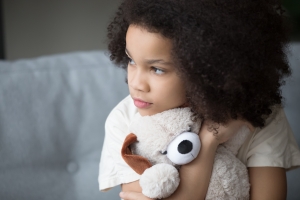By AARTI PATEL, MD
 Everyone experiences some anxiety and that is no different for children, especially during the COVID-19 pandemic.
Everyone experiences some anxiety and that is no different for children, especially during the COVID-19 pandemic.
Anxiety in children can vary based on stages of development. For example, as young as 8 months through the preschool years, even the healthiest child can show anxiety during times of separation from their parent or the people who make them feel the safest. Young children may have short-lived fears, such as fear of the dark, storms, strangers and especially now worries about getting sick during the pandemic.
In school-aged children, anxiety can look more like irritability and they can act tense or uptight – they will seem to need a lot of reassurance for their worries. Anxiety may interfere with school motivation or overall activity level due to avoidance behavior. Because anxiety is a normal part of the uncertainty that the pandemic has created, it’s important for parents to observe and know when their child’s anxiety has become unhealthy.
Basic signs of anxiety:
- Many worries about things before they happen
- Constant worries or concerns about family, school, friends, or activities
- Repetitive, unwanted thoughts (obsessions) or actions (compulsions)
- Fears of embarrassment or making mistakes leading to avoidance
- Low self-esteem and lack of self-confidence
Common types of anxiety in children:
- Generalized Anxiety Disorder: Excessive anxiety and worry about events or activities such as school. The child or adolescent has difficulty controlling worries. There may also be restlessness, fatigue, difficulty concentrating, irritability, muscle tension, and sleep difficulties.
- Panic Disorder: The presence of recurrent, unexpected panic attacks and persistent worries about having attacks. Panic Attack refers to the sudden onset of intense apprehension, fearfulness, or terror, often associated with feelings of impending doom. There may also be shortness of breath, palpitations, chest pain or discomfort, choking or smothering sensations, and fear of “going crazy” or losing control.
- Phobias: Persistent, irrational fears of a specific object, activity, or situation (such as flying, heights, animals, receiving an injection, seeing blood). These intense fears cause the child or adolescent to avoid the object, activity, or situation.
During this COVID-19 pandemic, it is important to notice some specific symptoms – avoiding social communication with friends and family by isolating themselves, spending excessive time on social media or video games, not eating regular meals and fears of going outside. Many children may struggle with not being able to fall asleep or stay asleep.
Severe anxiety problems in children can be treated. Early treatment can prevent future difficulties, such as loss of friendships, failure to reach social and academic potential, and feelings of low self-esteem. Treatments may include a combination of the following: individual psychotherapy, family therapy, medications, behavioral treatments, and consultation with teachers and administrators.
Parents should be alert to the signs of severe anxiety so they can intervene early to prevent complications and should consider seeking an evaluation from a qualified mental health professional or a child and adolescent psychiatrist.

About the Author
Aarti Patel, MD, is a Child and Adolescent Psychiatrist at Lakeland Regional Health who specializes in the diagnosis and the treatment of disorders of thinking, feeling and/or behavior affecting children, adolescents, and their families. A comprehensive diagnostic examination is performed to evaluate the current problem, with attention to its physical, genetic, developmental, emotional, cognitive, educational, family, peer, and social components. Along with this, Dr. Patel pays close attention to biological, psychological, and social factors as she works with each patient.
For more information about Behavioral Health
services at Lakeland Regional Health, click here.
To make an appointment with Dr. Patel, please call 863.687.1222.

